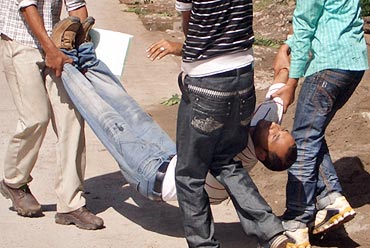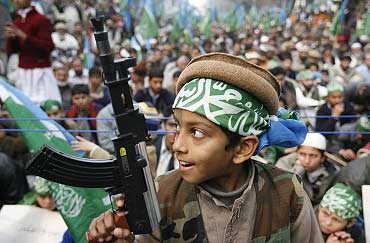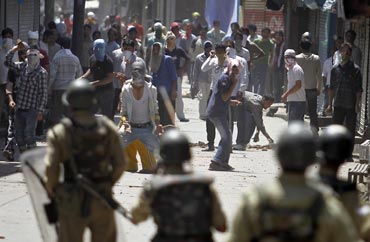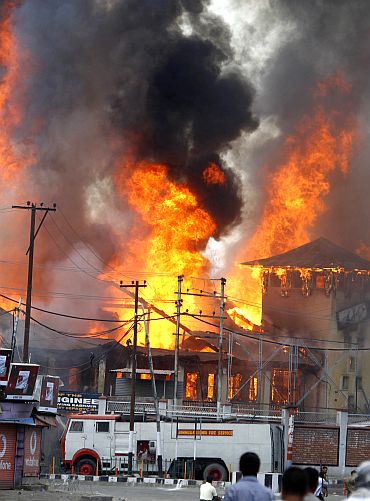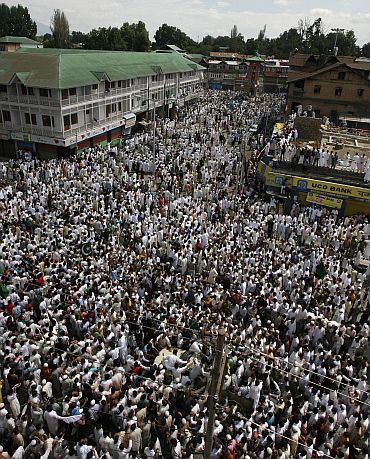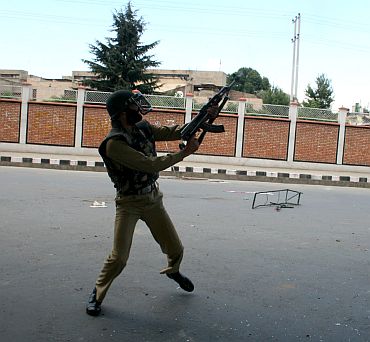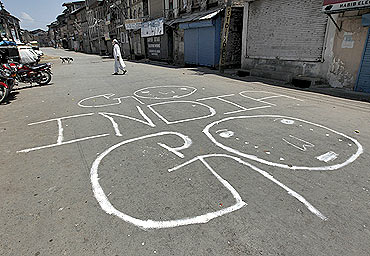 | « Back to article | Print this article |
Protests, violence, curfew: Kashmir's story in 2010
Months of unrest marked by stone-pelting protests, the deaths of over 100 people, the infamous Macchil fake encounter case and allegations of human rights violations kept Jammu and Kashmir in the news in 2010.
Naming of an all-party delegation headed by Home Minister P Chidambaram for reaching out to the people of Kashmir, appointment of three interlocutors, over 100 infiltration bids along border areas were other top stories of the year which also saw the state's key tourism sector being hit hard.
As street protests in the Valley intensified during the summer and the death toll in alleged security forces' action mounted, voices were raised for the removal of Chief Minister Omar Abdullah.
How the protests started
Omar's statement in the state assembly that Kashmir had acceded and not merged with India also created a furore, with the Bharatiya Janata Party calling for his removal.
But he preferred to maintain silence and this, in a way, served him well as the summer protests soon fizzled out.
The year began with a suicide attack by Lashkar-e-Tayiba militants in Lal Chowk area of the city -- the first in nearly three years -- on January 6. However, the death of a youth, who was injured in firing by security forces near the venue of the encounter, two days later, was perceived as a violation of human rights by people.
The incident was followed by the killing of a 13-year-old boy in Gojwara area of the city as police fired tear gas shells on January 30. While locals claimed that the action was unprovoked, police maintained that the boy, along with other youths, had attacked them.
The shameful Macchil fake encounter case
The separatists called for a strike and Srinagar was shut down for four days. Six days later, another teenager was allegedly shot dead by Border Security Force personnel in Nishat area of the city and Srinagar again observed four days of shutdown.
The government acted upon the allegations and the commandant of the BSF unit and a constable were arrested after investigations proved there was a prima facie case against the duo. Commandant R K Birdhi became the highest ranking officer of the BSF to be arrested and face murder charges.
Even before the controversy surrounding the killing of the two boys could die down, the Macchil fake encounter case came to light in early May. Again, the government acted suo motto and brought charges against nine army officials and two civilians for allegedly killing three civilians in a fake encounter and passing them off as foreign militants trying to infiltrate into the valley.
Shutdown, protests and curfew
There was widespread outrage against the incident and calls for revocation of the Armed Forces Special Powers Act grew louder from both mainstream parties and separatists.
Although the state government blamed the Macchil incident for the summer unrest in the Valley, the killing of another teenager in police action at Gojawara on June 11 is widely considered as the reason for the five months of shutdown, protests, curfew and further killings.
The Valley was gripped in a vicious cycle of protests and killings followed by more protests and killings. As the death toll mounted, public anger grew and incidents of arson were witnessed very frequently. Government buildings and the police force became the prime target of the protesters.
The unrest cost nearly 1,00,000 jobs
Several buildings including police stations and police posts were set ablaze. Residences of several policemen were also torched and there were reports of distress resignations among the force personnel.
As the situation was going out of hand, the government imposed a curfew, but it did not have the desired effect as people defied restrictions in a way never witnessed before in the history of Kashmir.
The unrest had cost nearly 1,00,000 jobs in the private sector and an estimated loss of Rs 30,000 crore to the business community of the state which includes the government. The tourism sector, which was expecting a booming season, was crippled as visitors skipped Kashmir due to safety concerns.
Centre appoints interlocutors
However, the Amarnath yatra passed off peacefully despite coinciding with the peak of the unrest. As the situation in the Valley spiralled beyond control, the Centre announced the all-party delegation. However, the refusal of separatists to meet the delegation put a dampener on the hopes of peace mongers.
The BJP also distanced itself from the move of some delegation members calling on pro-secession forces at their residences.
The interlocutor trio -- senior journalist Dileep Padgaonkar, academician Radha Kumar and Information Commissioner M M Ansari -- went about their assignment by meeting the people, but the separatists stayed away.
Nearly 100 militants sneaked in
As the mighty Chinars, witness to many a political rumbling in Kashmir, started shedding their leaves, the fire and steam of the street protests also fizzled out in the wake of a swoop carried out by the police against protesters and stone-pelters.
Hundreds were arrested and dozens booked under the Public Safety Act, which provides for the detention of a person for up to two years without trial.
Despite maintaining a vigil along the Line of Control, police estimates said that nearly 100 militants managed to sneak in along the LoC in Baramulla, Kupwara and Bandipora districts and an equal number of militants were neutralised.
